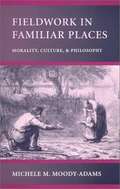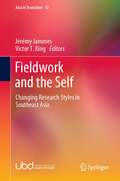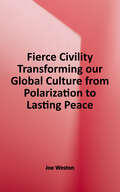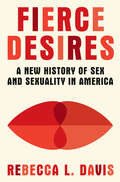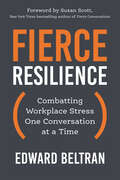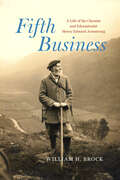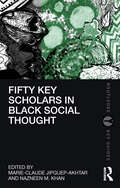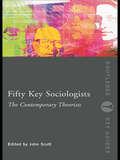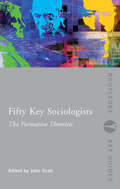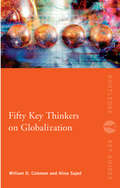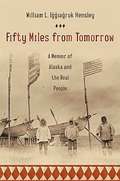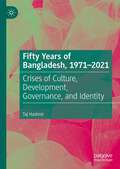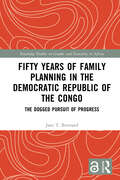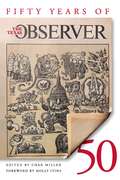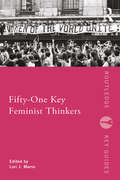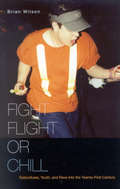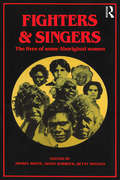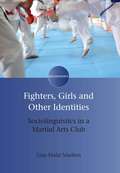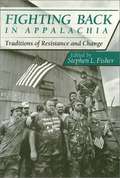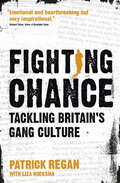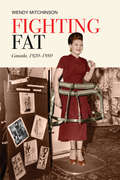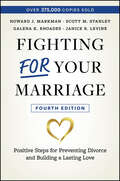- Table View
- List View
Fieldwork In Familiar Places: Morality, Culture, And Philosophy
by Michele M. Moody-AdamsThe persistence of deep moral disagreements--across cultures as well as within them--has created widespread skepticism about the objectivity of morality. Moral relativism, moral pessimism, and the denigration of ethics in comparison with science are the results. Fieldwork in Familiar Places challenges the misconceptions about morality, culture, and objectivity that support these skepticisms, to show that we can take moral disagreement seriously and yet retain our aspirations for moral objectivity. Michele Moody-Adams critically scrutinizes the anthropological evidence commonly used to support moral relativism. Drawing on extensive knowledge of the relevant anthropological literature, she dismantles the mystical conceptions of "culture" that underwrite relativism. She demonstrates that cultures are not hermetically sealed from each other, but are rather the product of eclectic mixtures and borrowings rich with contradictions and possibilities for change. The internal complexity of cultures is not only crucial for cultural survival, but will always thwart relativist efforts to confine moral judgments to a single culture. Fieldwork in Familiar Places will forever change the way we think about relativism: anthropologists, psychologists, historians, and philosophers alike will be forced to reconsider many of their theoretical presuppositions. Moody-Adams also challenges the notion that ethics is methodologically deficient because it does not meet standards set by natural science. She contends that ethics is an interpretive enterprise, not a failed naturalistic one: genuine ethical inquiry, including philosophical ethics, is a species of interpretive ethnography. We have reason for moral optimism, Moody-Adams argues. Even the most serious moral disagreements take place against a background of moral agreement, and thus genuine ethical inquiry will be fieldwork in familiar places. Philosophers can contribute to this enterprise, she believes, if they return to a Socratic conception of themselves as members of a rich and complex community of moral inquirers.
Fieldwork and the Self: Changing Research Styles in Southeast Asia (Asia in Transition #12)
by Victor T. King Jérémy JammesThis book presents new perspectives on Southeast Asia using cases from a range of ethnic groups, cultures and histories, written by scholars from different ethnicities, generations, disciplines and scientific traditions. It examines various research trajectories, engaging with epistemological debates on the ‘global’ and ‘local’, on ‘insiders’ and ‘outsiders’, and the role played by personal experiences in the collection and analysis of empirical data. The volume provides subjects for debate rarely addressed in formal approaches to data gathering and analysis. Rather than grappling with the usual methodological building blocks of research training, it focuses on neglected issues in the research experience including chance, error, coincidence, mishap, dead ends, silence, secrets, improvisation, remembering, digital challenges and shifting tracks. Fieldwork and the Self is relevant to academics and researchers from universities and international organisations who are engaged in teaching and learning in area studies and social science research methods. “A rich and compelling set of writings about fieldwork in, and beyond, Southeast Asia”. — Lyn Parker, Emeritus Professor, University of Western Australia “A must-read for all, especially emerging scholars on Southeast Asia, and a refreshing read for critical ‘old hands’ on the region”. — Abdul Rahman Embong, Emeritus Professor, Institute of Malaysian and International Studies (IKMAS), Universiti Kebangsaan Malaysia “An impressive collection of essays by two academics who have devoted their academic life to anthropological fieldwork in Southeast Asia”. — Shamsul A.B., Distinguished Professor and UNESCO Chair, Universiti Kebangsaan Malaysia “The contributors share an unquenchable and passionate curiosity for Southeast Asia. They have survived the uncertainties and disillusionment of their fieldwork and remained first-grade scholars”. — Marie-Sybille de Vienne, Professor, National Institute for Oriental Languages and Civilisations, Paris “A penetrating reflection on current social science research on Southeast Asia”. — Hans-Dieter Evers, Professor Emeritus and Senior Fellow, University of Bonn
Fierce Civility: Transforming our Global Culture from Polarization to Lasting Peace
by Joe WestonHas the world gone mad? Will war and conflict ever end? Civil unrest seems rampant as we’ve become polarized to the point of extremism. Most of us know things have to change so we can find our way back to one another. But how? Fierce Civility: Transforming our Global Culture from Polarization to Lasting Peace answers these questions and more by providing a step-by-step journey into a dynamic new human story with hope at its foundation. It lays out the Fierce Civility Pathway of Hope, a sweeping, bold yet highly relational and pragmatic plan to break the gridlock of polarization and get us talking again. The author invites readers to explore: - How do we confront a bully without becoming one? - How do we advocate for social and cultural transformation without adding to the tension or causing harm? - How do we take care of ourselves and increase our personal agency, fulfillment and resilience at a time when it seems more challenging to do so? Through strategies, skills and practices honed and road-tested during the author’s decades of work, Fierce Civility’s powerful approach is for anyone who is trying to find their grounding in these uncertain times, or is seeking a practical, heart-inspired methodology for making world peace, at long last, our reality. “Weston’s ‘skills of the heart’ can turn our ideas into action at a time when our future depends on our willingness to come together.” Dr. Carolyn J. Lukensmeyer, Founding Director of the National Institute for Civil Discourse
Fierce Desires: A New History of Sex and Sexuality in America
by Rebecca L. DavisFrom an esteemed scholar, a richly textured, authoritative history of sex and sexuality in America—the first major account in three decades. Our era is one of sexual upheaval. Roe v. Wade was overturned in the summer of 2022, school systems across the country are banning books with LGBTQ+ themes, and the notion of a “tradwife” is gaining adherents on the right while polyamory wins converts on the left. It may seem as though debates over sex are more intense than ever, but as acclaimed historian Rebecca L. Davis demonstrates in Fierce Desires, we should not be too surprised, because Americans have been arguing over which kinds of sex are “acceptable”—and which are not—since before the founding itself. From the public floggings of fornicators in early New England to passionate same-sex love affairs in the 1800s and the crackdown on abortion providers in the 1870s, and from the movements for sexual liberation to the recent restrictions on access to gender affirming care, Davis presents a sweeping, engrossing, illuminating four-hundred-year account of this nation’s sexual past. Drawing on a wealth of sources, including legal records, erotica, and eighteenth-century romance novels, she recasts important episodes—Anthony Comstock’s crusade against smut among them—and, at the same time, unearths stories of little-remembered pioneers and iconoclasts, such as an indentured servant in colonial Virginia named Thomas/Thomasine Hall, Gay Liberation Front cofounder Kiyoshi Kuromiya, and postwar female pleasure activist Betty Dodson. At the heart of the book is Davis’s argument that the concept of sexual identity is relatively novel, first appearing in the nineteenth century. Over the centuries, Americans have shifted from understanding sexual behaviors as reflections of personal preferences or values, such as those rooted in faith or culture, to defining sexuality as an essential part of what makes a person who they are. And at every step, legislators, police, activists, and bureaucrats attempted to regulate new sexual behaviors, transforming government in the process. The most comprehensive account of America’s sexual past since John D’Emilio and Estelle Freedman’s 1988 classic, Intimate Matters, Davis’s magisterial work seeks to help us understand the turmoil of the present. It demonstrates how fiercely we have always valued our desires, and how far we are willing to go to defend them.
Fierce Resilience: Combatting Workplace Stress One Conversation at a Time
by Edward BeltranDiscover the science-based secrets to reducing workplace stress, building unwavering resilience, and achieving success through the power of conversation.Technology, isolation, and increasing demands for productivity are making the workplace a hotbed for stress-it's no surprise employees are abandoning traumatic workplaces in unprecedented numbers.Ed Beltran,the CEO of a powerhouse leadership communication company, believes the antidote to stressed-out workplaces starts with conversation.Beltran has developed a science-based model to reduce stress and help people build what he calls fierce resilience. By leveraging the power of conversations, individuals discover: their unique stressors master skills to neutralize stressors build unwavering resilience that elevates their emotional well-being.This is no ordinary self-help book. The transformative process of fierce resilience goes well beyond developing mere coping skills. It helps people take control of their emotional health, become more resilient, and build organizations with resilience as a core part of their DNA.
Fierce, Fabulous, and Fluid: How Trans High School Students Work at Gender Nonconformity (Critical Perspectives on Youth #14)
by LJ SlovinHighlights the work trans youth do to create inclusive spaces in schoolsFierce, Fabulous, and Fluid presents a poignant critique of educational policies aimed at supporting trans and gender-nonconforming youth in schools. Over the years, caring adults have recognized these students as vulnerable and have tried to create inclusive environments to address their unique challenges. However, the book argues that these approaches have inadvertently perpetuated a narrow definition of trans identity, leaving many trans, non-binary, and gender-nonconforming youth feeling excluded and unseen.Based on a year-long ethnographic study conducted in a high school, LJ Slovin closely observes the experiences of gender-nonconforming youth who were often overlooked in the discussions about trans issues. Despite the lack of recognition, these hard-working young individuals persevered, navigating their identities and striving to thrive within the education system.Through their daily efforts, these young people tried to expand notions of gender in their school environment, building more inclusive spaces that embraced all trans identities. By sharing their stories, Slovin emphasizes the need for educators to shift away from a focus on risk and concern, to instead foster a celebration of trans and gender-nonconforming youth. The book urges educators to cultivate a genuine desire to understand and support trans youth, paving the way for a brighter and queerer future within educational settings.
Fifth Business: A Life of the Chemist and Educationist Henry Edward Armstrong (Synthesis)
by William H. BrockA biography of Henry Edward Armstrong, an underappreciated maverick in the history of chemistry. Fifth Business is a biography of the English chemist, educator, and scientific critic Henry Edward Armstrong. Today, Armstrong, who was a central figure in the development of the science of chemistry between 1885 and 1914, is more remembered for his campaigns to improve the teaching of chemistry, and science generally, and less for his theory of residual affinity and reverse electrolysis—or his hostility toward physical chemistry. However, right up until his retirement, Armstrong was a significant and prolific organic chemist, as well as a major figure in the academic and social life of the Chemical Society. Fifth Business is structured as chronologically as possible, with Armstrong’s life and achievements as an active chemist in Part I (1848–1911) and as a critic in his long retirement in Part II (1911–1937). Brock’s authoritative biography provides a unique inside look at its subject, allowing us to better understand the history of British science, scientific institutions, scientific education, pedagogical theory, and social relations of science during the last third of the nineteenth century and the first third of the twentieth.
Fifty Key Scholars in Black Social Thought (Routledge Key Guides)
by Nazneen M. Khan Jipguep-Akhtar, Marie-ClaudeFifty Key Scholars in Black Social Thought is a collaborative volume that uplifts and explores the intellectual activism and scholarly contributions of Black social thinkers. It implores readers to integrate the research of Black scholars into their teaching and research, and fundamentally, to rethink the dominant epistemological claims and philosophical underpinnings of the Western social sciences. The volume features 50 chapters, written by 55 scholars who explore the diverse contributions of notable Black thinkers, both historical and contemporary.Four thematic areas organize this work—Black epistemology, Black geopolitics, Black oppression and resistance, and Black families and communities. Through a close analysis of the fifty thinkers presented here, the chapters explore these themes while dismantling the whitewashed disciplinary histories, methodologies, and content that obscure and/or subjugate the significance of Black social thought. In addition to offering insightful and timely analysis, each chapter offers suggested readings for readers who would like to dive deeper into the work of Black social thinkers.This volume offers an accessible starting point for exploring the work of Black scholars past and present and their contributions to sociology and the social sciences more broadly. It is useful to students, academics, practitioners, and the lay public who are curious about Black social thought.
Fifty Key Sociologists: The Contemporary Theorists (Routledge Key Guides)
by John ScottFifty Key Sociologists: The Contemporary Theorists covers the life, work, ideas and impact of some of the most important thinkers in this discipline. Concentrating on figures writing predominantly in the second half of the twentieth century, such as Zygmunt Bauman, Pierre Bourdieu, Judith Butler, Michel Foucault and Claude Lévi-Strauss, each entry includes: full cross-referencing a further reading section biographical data key works and ideas critical assessment. Clearly presented in an easy-to-navigate A–Z format, this accessible reference guide is ideal for undergraduate and postgraduate students of sociology, cultural studies and general studies, as well as other readers interested in this fascinating field.
Fifty Key Sociologists: The Formative Theorists (Routledge Key Guides)
by John ScottCovering the life, work, ideas and impact of some of the most significant thinkers in sociology, Fifty Key Sociologists: The Formative Theorists concentrates on figures in the field writing principally in the nineteenth and early twentieth centuries. Including entries on Jane Addams, Theodor Adorno, George Lukács, Max Weber and Pitrim Sorokin, this practical text: is presented in an accessible A–Z format for maximum ease-of-use provides full cross-referencing and a further reading section for each entry, in order to allow the reader to broaden their understanding of the area includes biographical data for each of the figures covered. Presenting the key works and ideas of each sociologist featured, as well as providing some critical assessment of their work, this is an ideal reference guide for undergraduate and postgraduate students of sociology, cultural studies and general studies, as well as other readers interested in this important field.
Fifty Key Thinkers on Globalization (Routledge Key Guides)
by Alina Sajed William ColemanFifty Key Thinkers on Globalization is an outstanding guide to often-encountered thinkers whose ideas have shaped, defined and influenced this new and rapidly growing field. The authors clearly and lucidly survey the life, work and impact of fifty of the most important theorists of globalization including: Manuel Castells Joseph Stiglitz David Held Jan Aart Scholte Each thinker’s contribution to the field is evaluated and assessed, and each entry includes a helpful guide to further reading. Fully cross-referenced throughout, this remarkable reference guide is essential reading for students of politics and international relations, economics, sociology, history, anthropology and literary studies.
Fifty Miles from Tomorrow: A Memoir of Alaska and the Real People
by William L. Iggiagruk HensleyIn "Fifty Miles from Tomorrow," Hensley offers us the rare chance to immerse ourselves in a firsthand account of growing up Native Alaskan. There have been books written about Alaska, but they've been written by Outsiders, settlers. Hensley's memoir of life on the tundra offers an entirely new perspective, and his stories are captivating, as is his account of his devotion to the Alaska Native land claims movement. As a young man, Hensley was sent by missionaries to the Lower Forty-eight so he could pursue an education. While studying there, he discovered that the land Native Alaskans had occupied and, to all intents and purposes, owned for millennia was being snatched away from them. Hensley decided to fight back. In 1971, after years of Hensley's tireless lobbying, the United States government set aside 44 million acres and nearly $1 billion for use by Alaska's native peoples. Unlike their relatives to the south, the Alaskan peoples would be able to take charge of their economic and political destiny. The landmark decision did not come overnight and was certainly not the making of any one person. But it was Hensley who gave voice to the cause and made it real.
Fifty Years of Bangladesh, 1971-2021: Crises of Culture, Development, Governance, and Identity
by Taj HashmiThis book, the first historical sociology of its kind concerning Bangladesh, examines the country's what-went-wrong-syndrome during the first fifty years of its existence, 1971-2021. The work is an exception to the traditional studies on modern and contemporary Bangladesh. The study is also a post-history of united Pakistan. Busting several myths, it sheds light on many known and unknown facts about the history, politics, society, and culture of the country. Besides being a twice-born country – liberated twice, from the British in 1947 and from West Pakistanis in 1971 – it is also an artificial entity suffering from acute crises of culture, development, governance, and identity. Hashmi attributes the culture and identity crises to the demographic byproducts of bad governance. In addition to being overpopulated, Bangladesh is also resource-poor and has one of the most unskilled populations, largely lumpen elements and peasants. According to Marx, these people represent “the unchanging remnants of the past”. The second round of independence empowered these lumpen classes, who suffer from an identity crisis and never learn the art of governance. The proliferation of pseudo-history about liberation has further divided the polity between the two warring tribes who only glorify their respective idols, Mujib and Zia. Pre-political and pre-capitalist peasants’ / lumpen elements’ lack of mutual trust and respect have further plagued Bangladesh, turning it into one of the least governable, corrupt, and inefficient countries. It is essential to replace the pre-capitalist order of the country run by multiple lumpen classes with capitalist and inclusive institutions.
Fifty Years of Family Planning in the Democratic Republic of the Congo: The Dogged Pursuit of Progress (Routledge Studies on Gender and Sexuality in Africa)
by Jane T. BertrandThis book chronicles five decades of struggle to introduce family planning into one of the largest, most complex countries in sub-Saharan Africa: the Democratic Republic of the Congo (DRC).Interweaving details of major political, social, and economic events into the history of family planning in DRC (formerly Zaïre), the book analyses the achievements and setbacks of five decades of programmatic work. President Mobutu’s 1972 discourse on Naissances Désirables (desirable births) opened the door to organized family planning programs, which gained considerable momentum in the 1980s despite societal norms favoring large families. Two pillages and armed conflict paralyzed development work during the decade of the 1990s, and family planning was one of multiple public health programs that struggled to regain lost ground in the 2000s. With new donor funding and implementing agencies, the 2010s witnessed rapid programmatic expansion and improved strategies. By 2018, family planning was operating as a well-oiled machine. But progress is fragile. The book ends by tracing the deleterious effects of the colonial period to contemporary programming and individual contraceptive use. It asks hard questions about donor financing. And it details the six conditions needed to accelerate family planning progress in the DRC, in pursuit of providing millions of Congolese women and men with the means of controlling their own fertility.The book will be of interest to development and public health researchers and practitioners, as well as to historians of the Democratic Republic of the Congo.
Fifty Years of the Texas Observer
by Char MillerThe Texas Observer began publishing in Austin in 1954, and in the past five decades it has been an important voice in Texas culture and politics. Following in the muckraking tradition of George Seldes and I. F. Stone, the Observer has championed honest government, civil rights, labor, and the environment, providing a platform for many of the state's most outspoken writers - Roy Bedicheck, Willie Morris, Molly Ivins, Amado Muro, Maury Maverick, Jim Hightower, and Dagoberto Gilb, to name a few. To mark the Observer's fiftieth anniversary in 2004, Char Miller has gathered a cross-section of the best work to appear in its pages. While the Observer has ventured beyond Texas in its editorial coverage, Miller has chosen pieces that specifically speak to the state's politics, people, environment, culture, and locales. Together these pieces form a progressive chronicle of a half century of life in Texas.
Fifty-One Key Feminist Thinkers (Routledge Key Guides)
by Lori J. MarsoThe feminist thinkers in this collection are the designated "fifty-one key feminist thinkers," historical and contemporary, and also the authors of the entries. Collected here are fifty-one key thinkers and fifty-one authors, recognizing that women are fifty-one percent of the population. There are actually one hundred and two thinkers collected in these pages, as each author is a feminist thinker, too: scholars, writers, poets, and activists, well-established and emerging, old and young and in-between. These feminists speak the languages of art, politics, literature, education, classics, gender studies, film, queer theory, global affairs, political theory, science fiction, African American studies, sociology, American studies, geography, history, philosophy, poetry, and psychoanalysis. Speaking in all these diverse tongues, conversations made possible by feminist thinking are introduced and engaged. Key figures include: Simone de Beauvoir Doris Lessing Toni Morrison Cindy Sherman Octavia Butler Marina Warner Elizabeth Cady Stanton Chantal Akerman Betty Friedan Audre Lorde Margaret Fuller Sappho Adrienne Rich Each entry is supported by a list of the thinker’s major works, along with further reading suggestions. An ideal resource for students and academics alike, this text will appeal to all those interested in the fields of gender studies, women’s studies and women’s history and politics.
Fight AIDS!: How Activism, Art, and Protest Changed the Course of a Deadly Epidemic and Reshaped a Nation
by Michael G. LongAcclaimed author Michael G. Long tells the story of the devastating AIDS crisis and the trailblazing activists who fought for dignity, compassion, and treatment. Act up! Fight back! Fight AIDS! This was the slogan for ACT UP—or AIDS Coalition to Unleash Power—an activist organization that emerged in the 1980s during the height of the AIDS epidemic. The group was loud, direct, and confrontational as it fought for access to treatment, compassionate care, and recognition for everyone with HIV and AIDS. Tracing the history of the LGBTQ+ community from the Stonewall Riots and “gay liberation” movements to the groundbreaking protests of the 1980s and 1990s, Fight AIDS! is a gripping narrative of the AIDS epidemic for young readers, told through the lens of the activism it fostered. Focusing on the people most directly affected by the crisis and on the individuals who fought for justice, it is an intimate and humane account of one of the most devastating eras in United States history and an electrifying celebration of the power ordinary citizens have to enact meaningful change.
Fight, Flight, or Chill
by Brian WilsonFight, Flight or Chill explores the extent to which raver youths' experiences are constrained or determined by individualistic, high-tech, mass-mediated Western culture in which alienated and unfulfilled youth are apparently more at-risk for escapist and thrill-seeking behaviours. Wilson considers how raver youth creatively and proactively subvert these constraints in novel and empowering ways - from political activism to symbolic and stylistic expressions of resistance to community-building efforts. He also discusses the globalization and political economy of rave and youth culture and examines the ideologies that underlie simple solutions to the complex concerns over young people today.
Fight, Flight, or Chill: Subcultures, Youth, and Rave into the Twenty-First Century
by Brian WilsonFight, Flight or Chill explores the extent to which raver youths' experiences are constrained or determined by individualistic, high-tech, mass-mediated Western culture in which alienated and unfulfilled youth are apparently more at-risk for escapist and thrill-seeking behaviours. Wilson considers how raver youth creatively and proactively subvert these constraints in novel and empowering ways - from political activism to symbolic and stylistic expressions of resistance to community-building efforts. He also discusses the globalization and political economy of rave and youth culture and examines the ideologies that underlie simple solutions to the complex concerns over young people today.
Fighters and Singers: The lives of some Australian Aboriginal women
by Isobel White; Diane Barwick; Betty MeehanThe literature on Australian Aborigines is vast, but much of it is strangely silent about the experiences and activities of women. This collection of stories of the eventful lives and strong characters of a number of Aboriginal women offers a more intimate and personal view. Their lives span a century of history in fifteen communities scattered from Cape York Peninsula, Arnhem Land and East Kimberley to the Western Desert, the Centre, South Australia, Victoria and New South Wales.One of these stories is an autobiography and each of the others contains transcriptions or translations of a woman's own reminiscences, with additional details given by the author. Some women recall the first time they saw a European in their land, others tell how Europeans had influenced their communities generations before they were born. While the authors lived in Aboriginal communities in order to study some particular aspect of the society, the women they describe here became their close friends, companions and helpers, and this book is a record of friendships formed against differences of background, experiences and age.Allegiance to family and familiar territory shapes the personal histories of Aborigines in ways scarcely appreciated by people reared in nuclear family households in cities. The strength of family and community ties can be better understood through reading about the women who contribute so much to the maintenance of these communities.
Fighters, Girls and Other Identities
by Lian Malai MadsenThis book examines how young people at a martial arts club in an urban setting participate and interact in a recreational social community. The author relates analyses of their interactions to discussions of relevance to the sociology of sports, anthropology and education, ultimately providing an analytically nuanced contribution to the study of contemporary sociolinguistic processes and identity practices. The author explores how the young participants negotiate their place in the social order, create and maintain friendship groups and relate to different social categories using the ecological descriptions provided by linguistic ethnography. The book will appeal to researchers of discourse analysis, sociolinguistics, sport sociology, extra-curricular education and anthropology.
Fighting Back in Appalachia: Traditions of Resistance and Change
by Stephen L. FisherEssays explore various forms of resistance in Appalachia including community organizing and labor unions.
Fighting Chance: Tackling Britain's Gang Culture
by Patrick ReganReports of tragic teenage deaths and gang violence seem to dominate the media, yet rarely do we hear from the young people behind the headlines. Who are they? What makes them join gangs? Is there a way out?FIGHTING CHANCE fearlessly exposes the growing problem of gang culture, challenging us to look past the stereotypes and engage with the young people involved: to mentor them, listen to them and to inspire them to consider a different way of life - before it is too late.Without sensationalising or condemning, FIGHTING CHANCE exposes what drives young people into gangs - including poverty, family breakdown, and the need to belong. But the focus is on the solution: how to prevent people joining gangs in the first place, and how to help those deeply involved find a way out. Patrick Regan not only highlights the work of the individuals and organisations who are already tackling Britain's gang problems but also challenges and inspires us to be part of the answer.
Fighting Fat: Canada, 1920-1980
by Wendy MitchinsonWhile the statistics for obesity have been alarming in the twenty-first century, concern about fatness has a history. In Fighting Fat, Wendy Mitchinson discusses the history of obesity and fatness from 1920 to 1980 in Canada. Through the context of body, medicine, weight measurement, food studies, fat studies, and the identity of those who were fat, Mitchinson examines the attitudes and practices of medical practitioners, nutritionists, educators, and those who see themselves as fat. Fighting Fat analyzes a number of sources to expose our culture’s obsession with body image. Mitchinson looks at medical journals, both their articles and the advertisements for drugs for obesity, as well as magazine articles and advertisements, including popular "before and after" weight loss stories. Promotional advertisements reveal how the media encourages negative attitudes towards body fat. The book also includes over 30 interviews with Canadians who defined themselves as fat, highlighting the emotional toll caused by the stigmatizing of fatness.
Fighting For Your Marriage: Positive Steps for Preventing Divorce and Building a Lasting Love
by Scott M. Stanley Howard J. Markman Galena K. Rhoades Janice R. LevineA major revision of the classic divorce prevention book, with up-to-date research and inclusive content Fighting for Your Marriage is based on the widely acclaimed PREP approach (Prevention and Relationship Education Program). Research has found that couples who use these strategies can handle conflict more constructively, protect their happiness, and reduce the odds of breaking up. Based on more than 40 years of evidence, this book shows couples how to talk more and fight less, protect their friendship, and keep the fun alive. You'll learn what it takes to have a more intimate, sensual relationship and how to clarify and act on priorities. The 4th Edition has been substantially updated with advice for couples from a wide range of backgrounds and types who are interested in lasting love. The authors have included a wealth of techniques and down-to-earth guidance for all couples who seek to promote greater connection and pleasure in their long-term relationships. After reading the 4th edition, you will be able to: Apply up-to-date, research-backed strategies, using the renowned PREP approach to deepen your relationships Rekindle your marriage and bridge the emotional distance that has grown between you and your spouse Repair your or your partner's lack of desire for sensual and sexual connections Get research-based advice for enhancing and strengthening relationships for people who are interested in lasting love For decades, this book has helped couples in serious relationships, newly married couples, and long-term married couples. It is also a valuable resource for couples and family therapists, college professors, clergy, and other professionals working with diverse individuals and couples who want to have happy, healthy relationships.
